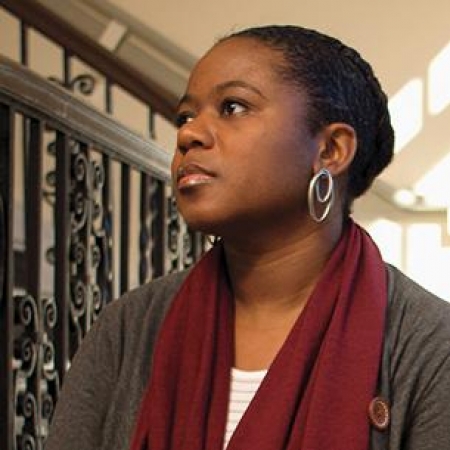The boxes had been stored for years, unopened and unknown in a warehouse before they arrived at the doorstep of author and journalist A’Lelia Bundles. Hidden in one was a discovery: a signed copy of a book by Langston Hughes dedicated to her great-grandmother, pioneering American businesswoman A’lelia Walker. Without this unexpected delivery, this window into the correspondence between key players in the Harlem Renaissance would have been lost from the historical record.
Vital pieces of history are discarded every day — especially the artifacts from the lives of people of color, underrepresented in the archives of educational institutions. “Our stories are important. Our stories are scattered. We must save our papers and encourage our family members to do the same,” Ms. Bundles said at a recent panel discussion organized by Schlesinger Library. A group of passionate primary source researchers convened at the Radcliffe Institute for Advanced Study for a conference entitled “A More Complete Record: The Case for Archival Partnerships.” Scholars, librarians, archivists, and authors demonstrated the power of institutional partnerships in gathering artifacts of black lives and preserving them for scholars.
A National Park Service Ranger, the founding director of the Women’s Research and Resource Center at Spelman College, library directors from across the country (Emory University, University of Texas, and University of Colorado at Boulder), and a community college librarian from Tennessee were among the representatives from institutions that preserve and care for black collections, including many from historically black colleges and universities (HBCUs) as well as community repositories gathered to address the importance of preserving and increasing access to the archives of underrepresented groups. Only a decade ago, this type of cross-institutional gathering would have been unheard of.

Partnership between HBCUs and predominantly white institutions (PWIs) was key to creating a new role at Schlesinger Library. Librarians at Schlesinger invited Holly A. Smith, the College Archivist at Spelman College, as the first of three consultants — including Khalil Muhammad, Professor of History, Race and Public Policy at Harvard Kennedy School, and Krystal Appiah, Instruction Librarian for Special Collections at the University of Virginia Library — to help the library diversify its collections and shape a new curatorial position. In June 2015, Smith gave a talk on documenting African-American women’s history and diversity within the library science profession. She met with staff and the acquisitions committee and her voice was instrumental in creating the new role at Schlesinger: Curator for Race and Ethnicity.
In 2016, the library hired Dr. Kenvi Phillips as the first Curator for Race and Ethnicity. “What we learned from Holly Smith, Khalil Muhammad, and Krystal Appiah helped us refine our concepts for the position,” said Amanda Strauss, Manager of Special Projects and Digital Services at Schlesinger.
“My role is to help raise the voices and highlight the accomplishments of women who are underrepresented at Schlesinger and often undervalued in American society,” Dr. Phillips said. She builds relationships with community members who are underrepresented in Harvard Library’s collections through personal outreach, public programming, and exhibitions.
"Creating this role at Harvard and hiring Dr. Kenvi Phillips is critical to documenting the stories of women of color, who have been historically marginalized and under-documented in the archival record." Holly A. Smith, College Archivist at Spelman"Creating this role at Harvard and hiring Dr. Kenvi Phillips is critical to documenting the stories of women of color, who have been historically marginalized and under-documented in the archival record," said Holly A. Smith, College Archivist at Spelman.
“Archivists of color should be in positions of influence at predominantly white institutions,” said author Valerie Boyd, underscoring the fact that the libraries at PWIs need to have a diverse and sensitive staff that understands the value of the collections they need to acquire. “Having faculty members partner with these libraries helps assure that the collections will be well-used and well-regarded.”
Another key factor in partnership across institutions is equal collaboration. Garrett Felber, a visiting scholar in the Charles Warren Center for Studies in American History at Harvard, shared that predominantly white institutions often selectively spotlight one or two famous alumni of color at their universities to create an overinflated sense of being on the right side of history. By providing funding to send white students or librarians at PWIs to do research with archivists at HBCUs — and vice versa — we can work towards a more complete historical record that doesn’t whitewash the painful past and accounts for all voices. Megan Sniffin-Marinoff, University Archivist at Harvard, shared that universities shouldn’t be scared of what’s in their archives. By opening our eyes to the value of finding and preserving the archives of underrepresented groups, we’re “revealing a dimension that kills the myth,” said Ms. Bundles.